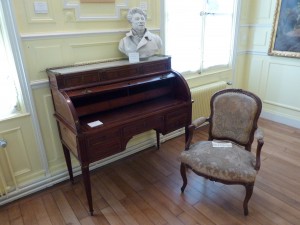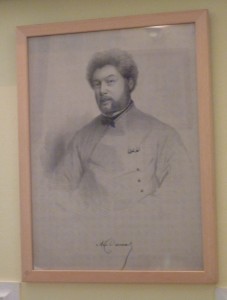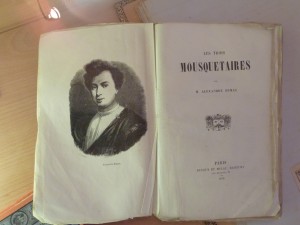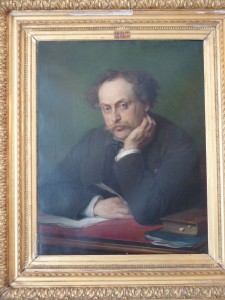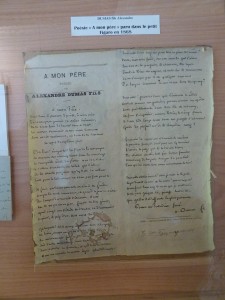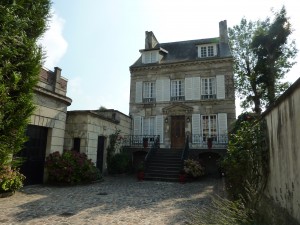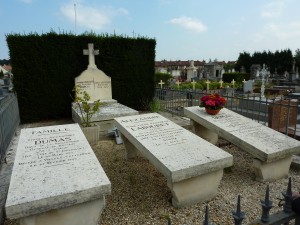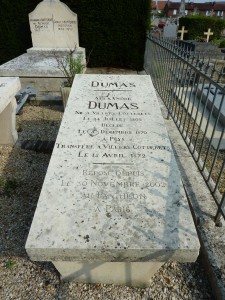Until recently, every time that I gave my Entrée to Black Paris tour called Black Paris after WWII and told the story about how the remains of Alexandre Dumas were transferred from his hometown of Villers-Cotterêts to the Pantheon in Paris, I would think to myself that I should someday make the short trek up to Picardie to see the original gravesite and the town where Dumas grew up. I made this trek a few days ago, and I am happy to share the details with you!
Last Thursday, Tom and I were treated to a special day trip to the region of Picardie by two friends—Elizabeth and David Berry. We visited the Royal Abbey of Chaalis in the morning, lunched at the Château d’Ermenonville, and visited the town of Villers-Cotterêts in the afternoon. The weather was perfect, the sites intriguing, and the meal sublime!
Down the street from the statue of Alexandre Dumas, which stands in the place du Docteur Jean Mouflier, lies the Alexandre Dumas Museum. For such a small museum, there is plenty to see! The museum consists of three rooms—one devoted to Dumas’ father, General Thomas-Alexandre Dumas; one to Dumas père (the writer that we know and love—the author of The Three Musketeers, The Count of Monte Cristo, and The Man in the Iron Mask among myriad works); and one to Alexandre Dumas fils (son of Alexandre Dumas père). Thomas-Alexandre Dumas was born in Saint Domingue (Haiti) of a French marquis and a slave mother; hence, all three generations had African ancestry.
A beautiful portrait of the general, who served in Napoleon Bonaparte’s army, dominates the first room. Dumas was part of Napoleon’s Egyptian adventure, but fell out of favor with the Emperor and never received the pension that he was due once he left the army. On the way home from Egypt, he was forced to leave his ship in Taranto (Italy) and was imprisoned at Brindisi. While in prison, he contracted an illness from which he never fully recovered, and died a weak and impoverished man in Villers-Cotterêts in 1806.
General Dumas’ room contains numerous documents written by him, illustrations of him, and other artifacts.
In Alexandre Dumas père’s room, one finds several portraits and photos of him, his writing desk, a pair of boots, and many other artifacts.
Here is a lithograph portrayal of Dumas that is unlike any other that I have seen:
There is also an original version of The Three Musketeers, which is open to the title page…
Alexandre Dumas père left Villers-Cotterêts in 1823 to seek his fortune in Paris. He went on to become France’s most prolific writer, a distinction that he still holds today. He gained and lost a couple of fortunes, traveled widely, and generally lived life to the fullest. He spent his last days in the care of his illegitimate daughter, Marie-Alexandrine Dumas, and died in the town of Puys in 1870.
In the room dedicated to Alexandre Dumas fils, the illegitimate and subsequently legally recognized son of Dumas père, there is a colorful portrait of him…
and a letter that he wrote to his father, published in Le Petit Figaro in 1868,
as well as other documents and artifacts. Dumas fils’ first play, The Lady of the Camelias, was an enormous success. It was the inspiration for Verdi’s opera La Traviata. He was inducted into the Académie Française in 1874 and awarded the Legion of Honor in 1894.
When we left the museum, we walked past the house in which Dumas père grew up…
on the way to the cemetery where the family plot lies.
Buried here are Thomas-Alexandre Dumas, his wife Marie-Louise-Elizabeth Labouret, and the daughter and son-in-law of Alexandre Dumas fils. As indicated on his cenotaph, the remains of Dumas père were transferred to the Pantheon in Paris in 2002.
Alexandre Dumas fils was not buried in the family plot. His grave is located in the Montmartre Cemetery in Paris.



